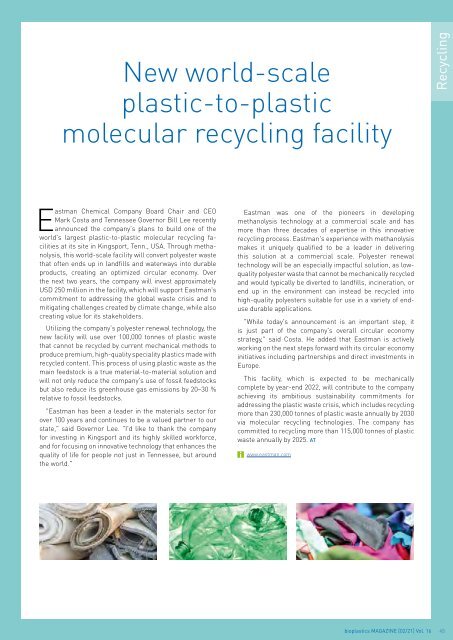issue 02/2021
Highlights: Injection Moulding Basics: Mass Balance
Highlights:
Injection Moulding
Basics: Mass Balance
Create successful ePaper yourself
Turn your PDF publications into a flip-book with our unique Google optimized e-Paper software.
New world-scale<br />
plastic-to-plastic<br />
molecular recycling facility<br />
Recycling<br />
Eastman Chemical Company Board Chair and CEO<br />
Mark Costa and Tennessee Governor Bill Lee recently<br />
announced the company's plans to build one of the<br />
world's largest plastic-to-plastic molecular recycling facilities<br />
at its site in Kingsport, Tenn., USA. Through methanolysis,<br />
this world-scale facility will convert polyester waste<br />
that often ends up in landfills and waterways into durable<br />
products, creating an optimized circular economy. Over<br />
the next two years, the company will invest approximately<br />
USD 250 million in the facility, which will support Eastman's<br />
commitment to addressing the global waste crisis and to<br />
mitigating challenges created by climate change, while also<br />
creating value for its stakeholders.<br />
Utilizing the company's polyester renewal technology, the<br />
new facility will use over 100,000 tonnes of plastic waste<br />
that cannot be recycled by current mechanical methods to<br />
produce premium, high-quality speciality plastics made with<br />
recycled content. This process of using plastic waste as the<br />
main feedstock is a true material-to-material solution and<br />
will not only reduce the company's use of fossil feedstocks<br />
but also reduce its greenhouse gas emissions by 20–30 %<br />
relative to fossil feedstocks.<br />
"Eastman has been a leader in the materials sector for<br />
over 100 years and continues to be a valued partner to our<br />
state," said Governor Lee. "I'd like to thank the company<br />
for investing in Kingsport and its highly skilled workforce,<br />
and for focusing on innovative technology that enhances the<br />
quality of life for people not just in Tennessee, but around<br />
the world."<br />
Eastman was one of the pioneers in developing<br />
methanolysis technology at a commercial scale and has<br />
more than three decades of expertise in this innovative<br />
recycling process. Eastman's experience with methanolysis<br />
makes it uniquely qualified to be a leader in delivering<br />
this solution at a commercial scale. Polyester renewal<br />
technology will be an especially impactful solution, as lowquality<br />
polyester waste that cannot be mechanically recycled<br />
and would typically be diverted to landfills, incineration, or<br />
end up in the environment can instead be recycled into<br />
high-quality polyesters suitable for use in a variety of enduse<br />
durable applications.<br />
"While today's announcement is an important step, it<br />
is just part of the company's overall circular economy<br />
strategy," said Costa. He added that Eastman is actively<br />
working on the next steps forward with its circular economy<br />
initiatives including partnerships and direct investments in<br />
Europe.<br />
This facility, which is expected to be mechanically<br />
complete by year-end 2<strong>02</strong>2, will contribute to the company<br />
achieving its ambitious sustainability commitments for<br />
addressing the plastic waste crisis, which includes recycling<br />
more than 230,000 tonnes of plastic waste annually by 2030<br />
via molecular recycling technologies. The company has<br />
committed to recycling more than 115,000 tonnes of plastic<br />
waste annually by 2<strong>02</strong>5. AT<br />
www.eastman.com<br />
bioplastics MAGAZINE [<strong>02</strong>/21] Vol. 16 45


















